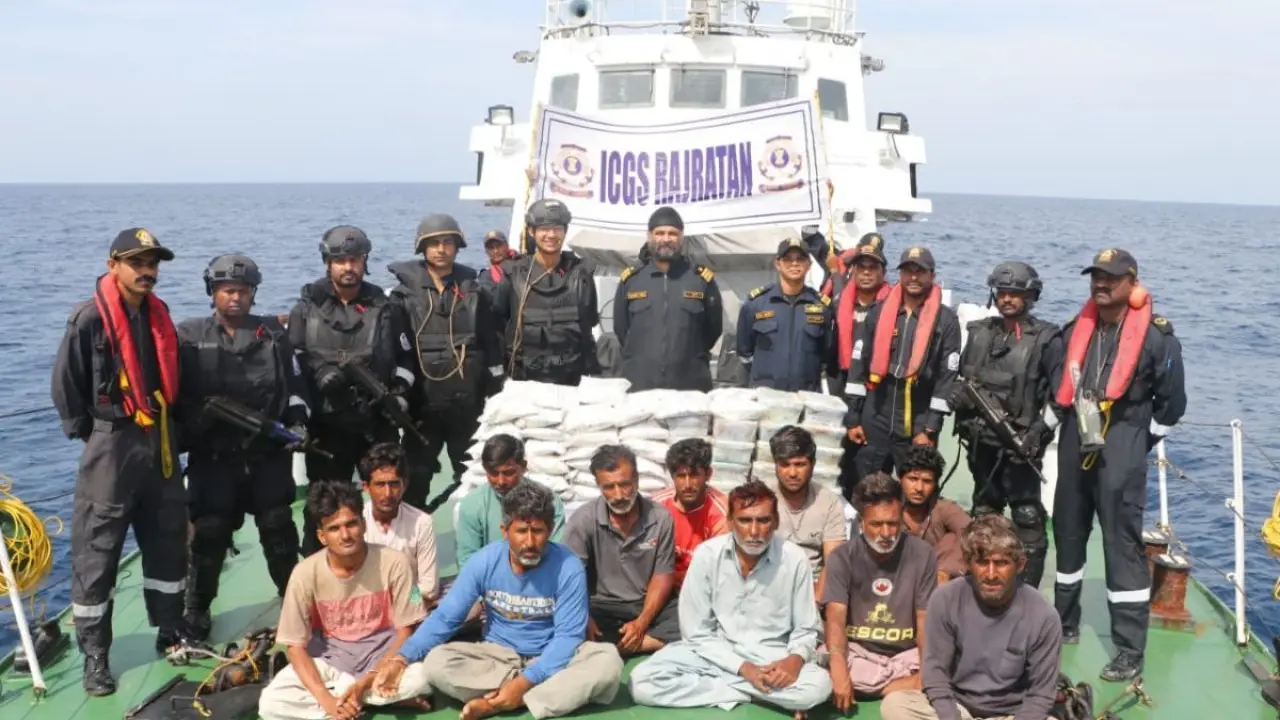
Pakistani Boat (Social Media)
World News: In a significant enforcement action, India’s Directorate of Revenue Intelligence (DRI) has seized an enormous consignment weighing 1,115 tonnes, allegedly smuggled from Pakistan through indirect routes involving third countries. The shipment was intercepted at various Indian ports after intelligence agencies flagged suspicious activities linked to the cargo’s origin. The goods, concealed under false documentation claiming origins in countries like the UAE and Singapore, included industrial chemicals, electronic components, and machinery with potential dual-use applications. This elaborate scheme aimed to bypass strict trade restrictions and scrutiny due to ongoing political tensions between India and Pakistan. The DRI’s operation, which involved months of surveillance and coordination with international customs bodies, has sparked diplomatic concerns and intensified calls for stricter import verification procedures. Security agencies are now examining whether the items were intended for legitimate industrial use or nefarious purposes. The bust highlights the complexities of trade security and the urgent need for enhanced customs intelligence to prevent similar attempts in the future.
The Directorate of Revenue Intelligence (DRI) has exposed a major attempt by Pakistan to covertly push goods into India through third-party nations. The consignment, weighing 1,115 tonnes, was intercepted at multiple Indian ports after intelligence flagged suspicious routing. Documents revealed origin masking, with Pakistani goods falsely labeled as originating from the UAE and Singapore. The massive haul included industrial chemicals, electronics, and machinery—items that typically require security scrutiny. Officials believe the consignment was meant for use in industries with dual-use potential, raising alarms about misuse. The operation took months of surveillance and coordination with international customs agencies. The discovery has sparked urgent reviews of India’s import verification protocols.
The goods were cleverly rerouted through intermediary nations to hide their Pakistani origin. Trade analysts say this tactic, known as transshipment masking, is often used to bypass sanctions or trade bans. In this case, consignments had false Certificates of Origin, with manipulated invoices and fake UAE export seals. Investigations suggest a network of traders and freight companies specializing in this illicit supply chain. The move appears to be part of a broader strategy to flood Indian markets with Pakistani goods despite strained diplomatic ties. DRI has now issued alerts across major ports and inland container depots to tighten inspections.
Among the seized items were high-grade industrial solvents, circuit components, and lab equipment—raising concerns of potential misuse. Security agencies are probing whether these goods were destined for legitimate commercial use or clandestine operations. Several items match components used in chemical and electronic surveillance systems. The Ministry of Home Affairs has been briefed, and National Security Council officials are now reviewing the case. Experts warn that unchecked imports of sensitive materials pose serious national security risks. Some of the seized goods are now undergoing forensic testing to assess their composition and purpose.
The revelation has sparked a political firestorm, with opposition parties questioning how such massive shipments went undetected for so long. Government sources say the operation was part of a larger covert effort that was being monitored for months. Union Finance Minister Nirmala Sitharaman praised the DRI team for their vigilance and coordination. Meanwhile, Pakistan has yet to issue an official response, but diplomatic tensions are expected to rise. BJP leaders have used the bust to underscore the need for stricter border and port controls. Opposition parties demand a white paper on high-risk imports.
This incident has put India’s trade scrutiny policies under the spotlight, especially regarding indirect trade with hostile nations. While there is no formal trade with Pakistan, indirect routing through Gulf countries has become common. Economists argue for a more robust end-use verification system and tighter customs partnerships with friendly nations. The DRI is reportedly collaborating with counterparts in the UAE and Singapore to track the full chain of exporters. Calls are growing for a technological overhaul of the customs intelligence network to pre-empt such infiltration attempts.
Indian manufacturers, especially in electronics and chemicals, have long complained about unfair competition from Pakistani goods entering indirectly. Industry bodies are now calling for immediate remedial tariffs and blacklisting of firms involved in the latest case. The Federation of Indian Export Organisations (FIEO) has urged the government to enhance vigilance and support local industry against covert imports. Some MSMEs claim they lost contracts to suppliers using cheaper Pakistani raw materials. The bust has reignited the demand for a unified import alert system and faster customs red-flag mechanisms.
The seizure is expected to have far-reaching consequences on India’s trade policy and security protocols. Strategic analysts believe this could trigger a new round of economic tightening on unofficial trade routes. The government is likely to roll out stricter port surveillance, enhanced documentation checks, and AI-powered cargo scans. India may also raise the issue in multilateral trade forums, pushing for cooperation on origin verification. While the immediate threat has been curbed, experts warn that similar attempts may follow. Vigilance, they say, must now be continuous—not reactionary





Copyright © 2026 Top Indian News
